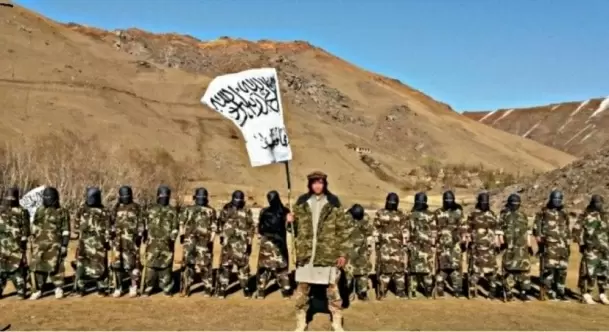'Tajik' Taliban creating havoc in Northern Afghanistan
New Delhi
30-July-2021

Photo:IANS
Alarm bells are ringing loud and clear in three Central Asian Republics (CAR) which share borders with Afghanistan -- Tajikistan, Turkmenistan and Uzbekistan.
Unsurprisingly, Moscow has beefed up the combat capabilities of its military base in Tajikistan, which includes training local soldiers on a significant scale. Moscow is warning the leadership in Dushanbe about the danger posed by the Islamic State, which has entrenched itself across the border in Afghanistan.
The Taliban's capture of the Northern region of Afghanistan, has in fact prompted Russia to significantly upscale its military profile on the borders with Afghanistan. To demonstrate its military clout Moscow is holding joint military drills, which will involve more than 1,000 Russian soldiers along with Uzbek and Tajik troops.
The August 5-10 exercise - a show of collective muscle flexing - will take place amid reports that the Taliban has handed over charge to Tajik militants to "govern" the region close to the Tajik border.
According to a report by the gandhara.rferl.org, the Taliban has deployed these militants of the "Tajik Taliban" to defend the captured districts Kuf Ab, Khwahan, Maimay, Nusay, and Shekay of Afghanistan's Badakhshan Province.
Fawzia Koofi, a member of the peace negotiating team of the Afghan government, told Tolo news that these "Taibans" are creating havoc in northern regions of Afghanistan.
Watch This TWL Video
"Now the activities and movements of foreign militants have increased more than any time before along the border areas and in the strategic locations which have come under Taliban control, unfortunately," said Koofi.
The Tajik Taliban is basically a group of militants of Tajikistan who have been fighting along with the Taliban in the Northern region of Afghanistan. According to the website, the Tajik militant group is led by Mahdi Arsalon , but whose real name is Muhammad Sharifov.
His 200-strong group of pro-Taliban Tajikistan militants are now controlling areas along Afghan-Tajik border.
Quoting the sources from Afghan officials, the website says that these Tajik fighters belong to the militant organisation Jamaat Ansarullah, also known as Ansarullah or Ansorullo�an organisation banned by the Tajikistan government.
Founded in 2009-10 by a former commander of Tajik army to overthrow the legitimate government in Dushanbe, the Ansarullah extremist group has been taking part in the Taliban offensives in Badakhshan, where the militant group captured large swaths of territory in recent months.
Tajik fighters in Badakhshan caught the Afghan government's attention last year when the insurgents brutally killed a group of of Afghan Army soldiers after the fall of the Maimay district to the Taliban. The group Ansarullah has links with other militant groups in Afghanistan and Pakistan, including the Tehreek e Taliban Pakistan (TTP), Islamic Movement of Uzbekistan (IMU) and al-Qaeda.
Under the US-Taliban deal in 2019, which was followed by the withdrawal of US troops has raised the morale of Central Asian Salafi-Jihadi groups. They did not hide their elation on social media, gushing praise for the Taliban. Central Asian Salafi-Jihadi groups are backed by al-Qaeda, Uzbek groups including Katibat Imam al-Bukhari (KIB), Katibat Tawhid wal Jihad (KTJ), and the Islamic Jihad Union (IJU), along with Tajik Jamaat Ansarullah (JA) and the Uyghur fighters of Turkestan Islamic Party (TIP) from China's Xinjiang region.
The US-Taliban agreement obliges the Taliban to sever ties with al Qaeda and other Central Asian terrorist groups and refuse them the possibility to threaten the security of the US and its allies using Afghan soil. However the Taliban did not keep its promise. Judging by their reactions, the Central Asian jihadists are not at all concerned over the Taliban's commitment to sever contacts with themselves and al Qaeda.
Central Asian governments have this apprehension that the Taliban will control Afghanistan in the coming months and the "Taliban factor" could also provide inspiration and a morale boost to underground radical Islamists inside Central Asia, encouraging them to fight against the secular regimes. If the Taliban comes to power in the future and establishes Sharia rule in Afghanistan, this could increase the activity of the Islamic opposition in the five countries to the north.
Russian Defence Minister Sergey Shoyguv warned that Russia will act immediately if there is a threat emanating toward Central Asia from Afghanistan.
Taliban's �friend", China has been wary of Afghanistan becoming a hub for the al-Qaida-backed Uyghur Muslim militant group, the East Turkestan Islamic Movement (ETIM), a separatist outfit waging an insurgency in volatile Xinjiang region. On Wednesday, the Chinese Foreign Minister Wang Yi made it clear to the Taliban delegation led by Taliban deputy political chief Mullah Abdul Ghani Baradar to "make a clean break" from all terrorists, including the anti-China East Turkestan Islamic Movement, or ETIM and the TTP. China believes that recent attacks on its nationals in China was the handiwork of the Uyghur militants with the TTP.-IANS
More Headlines
NPG Evaluates 8 Key Infrastructure Projects Under PM GatiShakti Plan
Rupee Symbol Debate Heats Up as Tamil Nadu Opts for ‘ரூ’
AIADMK Walks Out, BJP Boycotts Tamil Nadu Budget Session
AI Cybersecurity Startup Neural Defend Raises $600K in Pre-Seed Round
Chennai Doctor and Family Found Dead Amid ₹5 Crore Business Loss
NPG Evaluates 8 Key Infrastructure Projects Under PM GatiShakti Plan
Rupee Symbol Debate Heats Up as Tamil Nadu Opts for ‘ரூ’
AIADMK Walks Out, BJP Boycotts Tamil Nadu Budget Session
AI Cybersecurity Startup Neural Defend Raises $600K in Pre-Seed Round
Chennai Doctor and Family Found Dead Amid ₹5 Crore Business Loss










